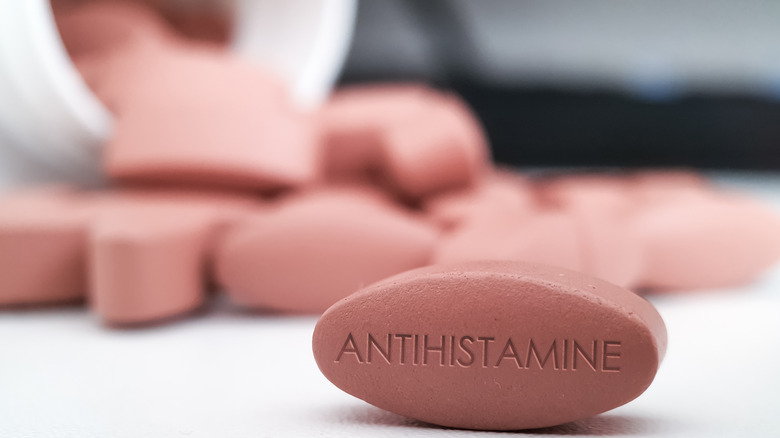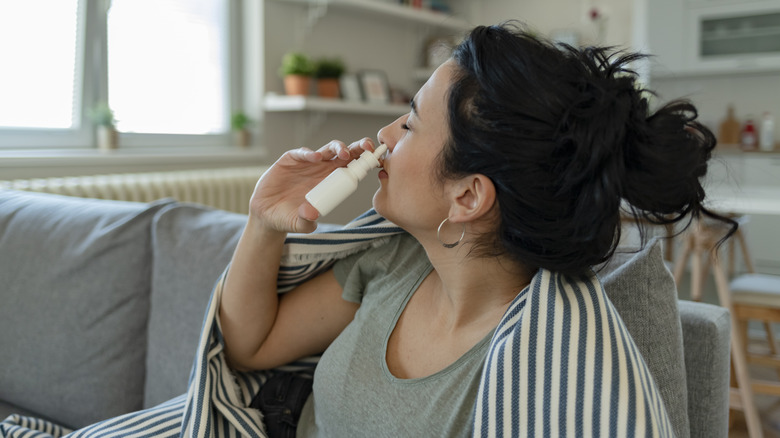The Medication You Should Avoid Taking Before Having Sex
Onions, beans, or garlic may work against us if we're looking to set the mood with ourselves or a partner. That's because eating certain foods before sex can leave us feeling sluggish, thirsty, constipated, or more. But food isn't the only thing that can negatively impact a sexual experience; so can common over-the-counter (OTC) medications that you might not otherwise think twice about. For people with allergies, this can include antihistamines.
Out of 2,000 survey respondents, 50% of people reported using antihistamine pills like Allegra, Benadryl, and Zyrtec in 2021 (via Statista). When the body releases too much histamine in response to an allergen, this produces an allergic reaction. Cue the coughing, congestion, and teary eyes, none of which are symptoms that leave us feeling particularly sexy. Thankfully, antihistamines can block this chemical release and help reduce symptoms quickly. But just like prescription drugs, OTC medications may have side effects, too. For antihistamines, this can include vaginal dryness, according to experts at Orange Coast Dermatology.
Antihistamines may cause vaginal dryness, sleepiness, or lowered libido
The dehydrating effects of antihistamines are what make them effective at combating allergy symptoms like a runny nose. While this may be great for a bout of sniffles, this same mechanism can work against us in the bedroom. "Antihistamines can lead to narrowing of blood vessels to constrict, so there's less blood flow and therefore fewer secretions throughout the body," OB-GYN Dr. Alyssa Dweck told Health. As a result, taking an antihistamine before sex may make self-lubrication difficult for people with vaginas. Additionally, these medications can also dehydrate the mucus membrane of the mouth (via Self). Unfortunately, nothing interrupts a makeout session quite like an unpleasant case of dry mouth.
Some antihistamines can also make us sleepy if they contain diphenhydramine (Benadryl), which may make us more inclined to retire to the bedroom — but not for sex. Even newer antihistamine drugs made with different active ingredients aren't immune to this potential side effect. Board-certified allergist Dr. Charles Joseph Lane told Self that this sedative effect is often reported by his patients in connection with Zyrtec. Alternatively, some antihistamines like Benadryl or Chlor-Trimeton may lower one's sex drive (via TIME).
What to do if antihistamine side effects are affecting your sex life
For allergy sufferers experiencing vaginal dryness in relation to antihistamine use, Dr. Alyssa Dweck told Health that it may be beneficial to opt for a nasal spray over an oral medication. This way, the drug would predominantly dry out the nasal cavity rather than the whole body. Just consult with your doctor before doing so. While some antihistamines can be purchased OTC, others require a prescription. Additionally, consider using a lubricant during sex. Depending on the chemical ingredients, some products may cause irritation or infection. Therefore, it's best to avoid those containing fragrance, flavors, parabens, and glycerin.
Alternatively, if it's the sedative effects of an antihistamine that are interfering with your sex life, talk to your healthcare provider about potentially switching to a different antihistamine medication or possibly altering the timing of the dose. MedlinePlus reports that while some antihistamines offer 24-hour symptom relief, others last only 4 to 6 hours.



